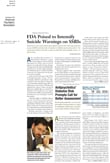Benzodiazepines are prescribed for patients with severe mental illness and co-occurring substance use disorder at a higher rate than for persons with severe mental illness alone—a prescribing pattern that would appear to fly in the face of APA guidelines.
In a retrospective study of benzodiazepine use among New Hampshire Medicaid beneficiaries, 62 percent of patients with schizophrenia and a co-occurring substance use disorder had been using benzodiazepines during the five-year period 1995-1999. This is compared with 54 percent for patients who had schizophrenia but no substance use disorder.
The rate of five-year benzodiazepine use among other mentally ill patients with and without a co-occurring substance use disorder was 75 percent versus 58 percent for bipolar disorder; 66 percent versus 49 percent for major depression; and 48 percent versus 40 percent for other psychiatric disorders.
The study, published in the February Journal of Clinical Psychiatry, examined Medicaid claims for 9,884 Medicaid beneficiaries aged 18 to 64 with schizophrenia, bipolar disorder, major depression, or other psychiatric disorders between 1995 and 1999. Rates and length of use and frequency of high potency/fast-acting prescriptions were compared for those with and without a claims-based substance use disorder diagnosis.
Study author Robin Clark, Ph.D., noted that APA’s 1990 guidelines on benzodiazepines use caution against long-term use by patients with substance use disorders because of the addictive potential of these medications.
Those guidelines recommend that physicians use the medications for brief treatment but conclude that “risks of chronic toxicity, especially cognitive impairment, true physiological dependence, and discontinuance symptoms, are all more likely under the following conditions: (1) high dose, (2) daily dosing of more than four months’ duration, (3) advanced age, (4) current use or history of sedative hypnotic and/or alcohol dependence, and (5) use of high-potency, short half-life benzodiazepines.”
“It’s clear from our study that the guidelines are not being followed,” Clark told Psychiatric News. “What needs to change, the prescribing patterns or the guidelines?”
He is director of research, design, and methods at the Center for Health Policy and Research at the University of Massachusetts Medical School.
Clark said the study does not explain why physicians appear to be prescribing benzodiazepines so extensively to patients with substance use disorders. Nor is it clear from the study, Clark said, whether patients in the study were primarily being treated by psychiatrists, primary care providers, or other physicians.
“Benzodiazepines are a very important classification of medication, and we are not suggesting that they should never be prescribed for people with substance use disorders,” he said. “But it seems that physicians, if they know about the substance abuse, are weighing the alternatives and deciding that it is more important to treat the anxiety.”
The study, “Benzodiazepine Prescription Practices and Substance Abuse in Persons With Severe Mental Illness,” is posted online at www.psychiatrist.com/abstracts/200402/020401.htm. ▪
